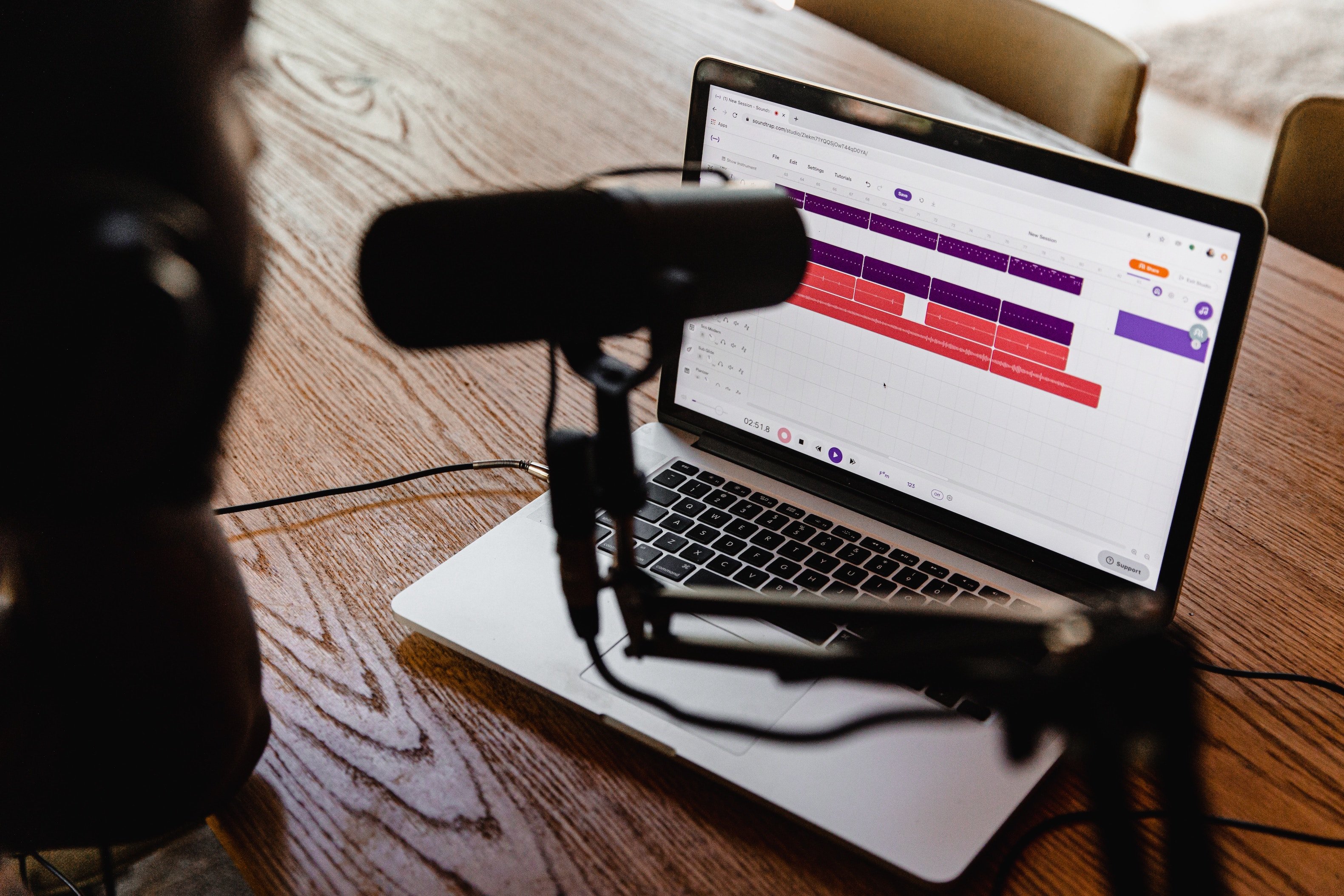RESOURCES
Branded Podcasts: Your Complete Guide to a Powerful Marketing Tool
It feels like podcasts have taken over the world in the last decade. From viral true crime shows to weekly news to behind-the-scenes chats about your favorite shows, there’s a podcast for everybody. The listeners are there, too – 90 million Americans tune in weekly to at least one podcast. For companies, branded podcasts are an opportunity to connect with these built-in audiences.
Branded podcasts can be a gold mine for companies looking to reach specialized audiences on a wider scale. Podcast audiences are highly engaged and already established, making them the perfect fit for your branded podcast. You can find the audience that is most likely to act and provide them with valuable, specialized content.
Read to find out why branded podcasts are some of the most powerful (and underrated) marketing tools available and why your brand needs one. When you're done, don't forget to check out our podcast Crack the Code!
Benefits of a Branded Podcast
Podcast listeners are a specific, desirable audience that’s already elected to participate in your business. Podcast listeners seek out shows about subjects that interest them, and with so many to choose from, they can pick and choose what to subscribe to over other similar podcasts.
This all means that if someone is listening to your podcast, they are already interested in what you have to say and the content of your podcast – this sets you up to build a strong connection that could turn into leads in the long run.
Consumers are also more amenable to ads and branding on podcasts than other mediums. Ads are common on podcasts and are usually done as “host reads,” where the host explains a product or service during the podcast recording, as opposed to pre-recorded outside ads.
81% of consumers take action after hearing an ad during a podcast and 58% said they’re more likely to remember a podcast ad than an ad they see somewhere else. Consumers willingly accept branding and ads on podcasts, making them a unique space for brands to thrive with their own content.
Brand Awareness
Branded podcasts lift brand favorability by 24% and brand consideration by 57%. People respond positively to podcasts, and a branded podcast gives consumers a unique behind-the-scenes look at some of their favorite brands and industries. With audiences already built into platforms like Spotify, the opportunity for brand awareness is limitless.
Community
Podcasts build online communities with your audience than can span all over the globe – popular podcasts inspire discussion boards. Several popular podcasts also do live recordings in front of audiences to allow them to engage more and get their faces in front of listeners. Regular podcast listeners become advocates for your podcast and your brand.
Additionally, a branded podcast can help you make connections with other brands and other podcasters. Inviting guests, appearing on other podcasts, and talking with hosts helps build a community that will help promote your brand.
Finding Your Target Audience
Just like any marketing endeavor, you’ll start your podcast journey by defining your audience persona. As you research, make sure to check out the top-performing podcasts and see what they cover, how they draw in their audiences, and any promotions they do.
Your podcast description should include SEO. Top-performing podcasts in your category can serve as inspiration for how to put together your description.
Make sure to connect with hosts of similar podcasts to build your network and create opportunities for cross-promotion and guest spots.
Utilize Podcast Analytics Tools
As marketers, we know that data is the backbone of any successful campaign. Your own branded podcast is no different. Podcast data should be a part of your research process before starting your podcast and your guidepost once you get started.
A great podcast analytics tool will give you both performance data, audience insights, and cost efficiency. Most of the big platforms for podcasts (Apple, Google, Spotify, etc) have their own analytics built in, but you can get additional tools like Podtrac and Chartable for an extra intuitive layer of data.
Creating and Promoting Your Podcast
Your podcast represents your brand and therefore needs to be high quality, useful, and stick to your brand story and messaging. You also need to offer something unique to consumers that will keep them coming back for your content.
Here are some tips to help you get started on your podcast and promote it:
- Select your topic. For example, our Code3 podcast, Crack the Code, provides industry insights and advice from people in marketing and advertising. This is specific enough to draw in an audience, but broad enough to give us room for plenty of creative ideas and topics. You want your podcast to follow this example – if you’re covering marketing, stay there. Don’t suddenly become a politics or human interest podcast.
- Create a schedule you can stick to. Your viewers will drop off if you don’t post consistently, and a regular schedule will lend legitimacy to your podcast and brand. Plus, it’ll help your team internally stay on schedule and produce the best possible content.
- Find a stellar host. You probably have the talent in your company already. Your social media team is a great resource since they likely have experience in front of the camera.
- Rehearse. Even if you find a host who has lots of video and audio experience, rehearsing is a must. Especially with multiple hosts, rehearsing can help you find your flow and uncover avenues of conversation you might have missed. Besides, who doesn’t want to be prepared as they go into a recording?
- Make an awesome trailer. You can post your podcast, description, and trailer before you have episodes. Make sure you have a strong, optimized description for your podcast and a trailer that sells your content and why people should listen. You can even hire a voice actor.
- Invite guests. As you plan your episodes, think about people who can serve as guests on your show. Ideal guests are recognizable to podcast audiences, experts in their fields, and can help cross-promote your podcast on their own podcasts or social media.
- Get reviews. Once you’ve posted your first podcast episode, make sure to ask for reviews in each episode. Tap into your individual networks to request reviews. Reviews will help your podcast rank in search, ensuring more listeners will find you.
- Post it on multiple platforms. Spotify, Apple Podcasts, Google Podcasts, Stitcher, and more are all platforms where you should post your podcast.
Podcasts are a fast-growing medium and one of the most underrated marketing tools for brands. Our advice? Start a podcast, find your people, and take advantage of this opportunity as soon as possible.
Ready to talk podcasting and other creative marketing trends? Contact us now to set up a time to chat.
SIMILAR POSTS YOU MIGHT BE INTERESTED IN:
SIGN UP FOR OUR WEEKLY NEWSLETTER

News, Views, and Valuable Resources
Delivered to Your Inbox Each Week




